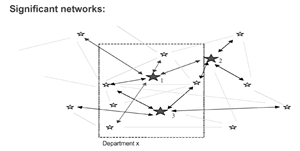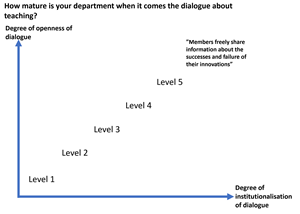
Newsletter November 2023: The teaching culture
In the November edition of our newsletter, we focus on the teaching culture - a factor of decisive importance for the teaching practices on the individual programmes - omnipresent and yet often rather invisible.
A teaching practice is not just the sum of organisation, resources, structure, and rules. It also consists of the values and self-understandings held by the people who populate these organizational structures. Formulated in theoretical language:
"A teaching practice consists of both actions, statements, spoken and unspoken rules that create a space for appropriate behaviour and where inappropriate or unacceptable actions are socially sanctioned (Reckwitz , 2002). The university or the academic community constitutes a practice, but an education also constitutes a practice, just like the individual teaching course or class course constitutes a practice. A community emerges where one behaviour is more common or socially accepted than another. These norms of appropriate behaviour are often unspoken and over time become tacit knowledge for those who are part of the practice. In summary, a practice that sets the framework for appropriate behaviour can be called a teaching and learning regime" (Herrmann & Bager-Elsborg, 2018, See also Trowler, 2008; Trowler & Cooper, 2002).
These teaching and learning regimes can be particularly conducive to good teaching; or they may weaken the same; they can support rules and standards or weaken them; and they can be weak or very strong and almost resistant to regulation and management ("culture eats strategies for breakfast").
There are countless examples of how 'silent assumptions about appropriate behaviour', 'implicit theories about students, teachers, teaching and learning' and 'conventions about appropriate and inappropriate behaviour in the teaching context' are at play in everyday teaching and set the framework for quality. Here just one example:
One can come across many interpretations of the concept of "responsibility for one's own learning" around various teaching environments. For some teachers (and students), the term is a summary of a learning theory that emphasizes that knowledge cannot be passively transferred but can only be absorbed through the cognizant subject's active linking of new knowledge to already acquired knowledge through work with the material. The concept thus becomes a rationale for designing activating teaching and expecting active students. But the term is also sometimes used by students as a justification for not needing to come prepared to class - "I am responsible for my own learning, it will be decided in the exam"; and teachers can, in a similar way, disclaim responsibility for the students' lack of preparation and participation with the same argument: "They are responsible for their own learning".
Teachers with different perceptions of 'responsibility for own learning' meet students with different expecta-tions and organize their teaching in very different ways.
The teaching culture as a crucial resource
Rules, strategies, and standards for regulating teaching do not work unless they are supported by a supportive teaching culture. Perhaps the most important aspects of a teaching culture cannot be regulated by rules at all. A strong and appropriate teaching culture can counter the need for rules, as it can replace rules with common norms and good judgment in the situation. And a vibrant teaching culture is a crucial resource in relation to quality, motivation, collaboration, peer training, alignment of expectations and communication, and much more.
Teaching cultures - the informal and the more planned conversations
The teaching culture is created and maintained through partly the informal conversations and partly the more agenda-driven conversations about teaching in which the teachers are involved.
Most lecturers have a small network of colleagues - maybe just 3-4 people - within and/or outside their own institute/department, with whom they occasionally talk about teaching or share experiences and problems, and whom they give advice and receive and listen to advice from. These can be conversations at the coffee machine, in the office (with the door closed), on the way home in the car, etc. The conversations are often in-formal, ad hoc, confidential, private, and based on a high degree of trust between those involved. The sum of these ongoing, spontaneous conversations is perhaps the most important source of an institute's teaching cul-ture.
See Torgny Roxå and Katarina Mårtenssons Article about "Significant conversations and significant networks - exploring the backstage of the teaching arena".
Another important source of the department's/department's teaching culture is more formal meetings and systematic conversations about teaching. It can be meetings in which the teachers participate in relation to e.g. planning and/or evaluation of courses, regular meetings in subject colleges, changes and redesign of teaching offerings and programmes, professional days, and seminars on teaching under the auspices of institutes or departments. Both the content, the degree of institutionalization (frequency and systematics) and the nature of these meetings are of great importance for the teaching culture. The more you can openly and confidently share successes and failures in your own teaching at such meetings, the better for the development of quality, competences, - and well-being.
See the discussion of John Biggs ' typology of conversations about teaching in the organization based on the two dimensions: (i) the degree of systematicity/institutionalization and (ii) the degree of openness in the conversation.
The spontaneous conversations in the close networks and the more formal conversations influence each other. If the lecturers generally experience that there is a supportive atmosphere around teaching at their institute, the more spontaneous conversations about teaching they will have with colleagues and the more people will be involved.
Systematic conversations about teaching at SDU
There are many examples of how, in various places at SDU, the conversation about teaching has been organised among the teachers.
For example, in the faculty college at Media Studies, there is a more than 13-year-old tradition of meeting for 2½ hours every month to discuss current teaching and more general teaching topics. The aim is to coordinate activities, share experiences and inspire each other, keep up to date on educational methods, and harmonize attitudes and expectations. All while respecting methodological freedom in teaching. The meetings have according to head of studies Sara Mosberg Iversen undoubtedly contributed to both increased quality in teaching and increased well-being among the teachers.
See the interview with head of study Sara Mosberg Iversen.
Inspiration day for heads of studies to organize the conversation about teaching
SDU UP offers an inspiration day for heads of studies, vice-deans, deputy heads of department and others with responsibility for teaching. The purpose of the day is to provide inspiration and help to systematically put teaching development on the agenda among the teachers in their own department.
The inspiration day will be offered for the first time on Thursday 7 December 2023 and will be offered continuously. On request, the course can also be tailored to a group of study leaders, for example from the same faculty.
See the invitation to the inspiration day and link to registration.
Literature
Biggs, J. (2003). Teaching for quality Learning. 2. ed. University Press, Buckingham.
Herrmann, K. J., & Bager-Elsborg, A. (2018). Når forberedelse er en pligt, og undervisningen er et privilegium: Et casestudie af universitetsstuderendes forberedelsespraksis. Dansk Universitetspædagogisk Tidsskrift, 24.
Roxå, T., & Martensson, K. (2009). Significant conversations and significant networks - exploring the backstage of the teaching arena. Studies in Higher Education (Dorchester-on-Thames), 34(5), 547-559. https://doi.org/10.1080/03075070802597200.
Trowler, P., and A. Cooper. (2002). Teaching and learning regimes: Implicit theories and recurrent practice in the en-hancement of teaching and learning through educational development programmes. Higher Education Research and Development, 21(3), 221-240. https://doi.org/10.1080/0729436022000020742.
Trowler, P. (2008). Cultures and change in higher education: Theories and practices. Basingstoke: Palgrave Macmillan
Monthly meetings about teaching in the teaching group of media studies
Conversation with head of studies Sara Mosberg Iversen, Media Studies, Department of Media, Design, Learning and Cognition, SDU
Inspiration day for study leaders and others
Put teaching development on the agenda in your local environment - set the conversation about teaching in a system
Torgny Roxå and Katarina Mårtensson's article on "Significant conversations and significant net-works – exploring the backstage of the teaching arena"


